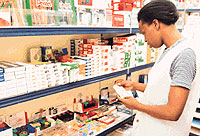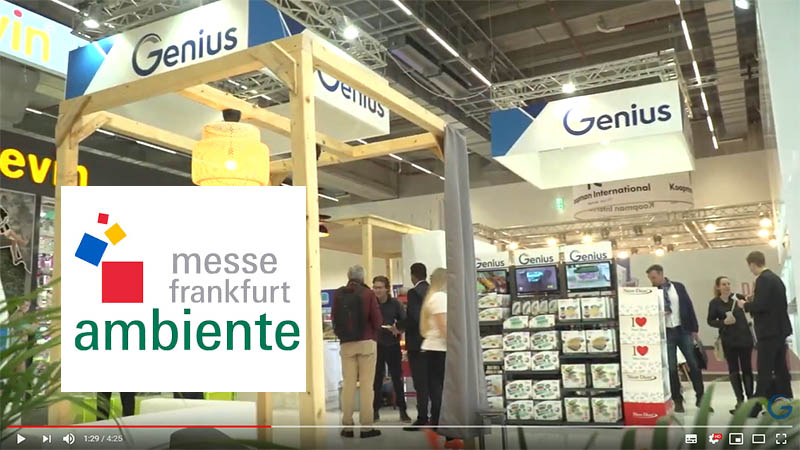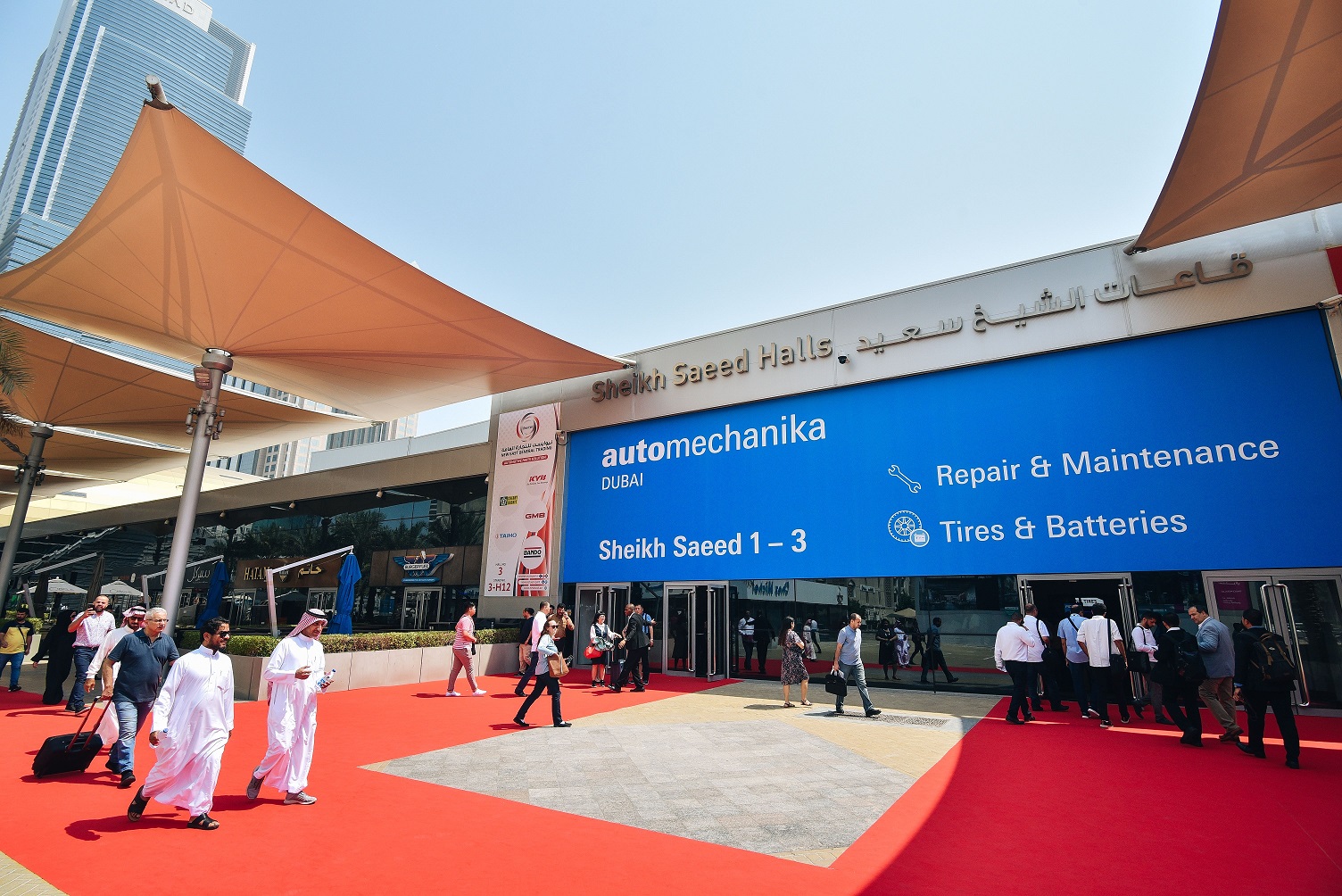Africa represents a huge market for stationery and a host of enterprising traders in Dubai – and elsewhere in the Gulf – are busy fulfilling a major slice of this demand. Sourcing products from North America, Europe, the Middle East and the Asia Pacific region, they are in a position to supply the entire gamut of stationery products including writing instruments, paper products, envelopes, fax rolls, photocopy paper, markers, staplers, highlighters, sticky tapes, note pads, drawing instruments and file covers, to mention just a few.
 Dubai has emerged as a major supplier of stationery and office automation products and has developed an extensive network of retailers, wholesalers and stockists with an impressive track record. According to a recent report issued by the Emirates Industrial Bank Journal, demand for stationery and allied paper products has seen a growth of almost 27 per cent in the last two years. A major portion of the increased imports of stationery products has been attributed to the increasing demand for these products in Dubai’s re-export markets, specially the emerging markets in Africa.
Dubai has emerged as a major supplier of stationery and office automation products and has developed an extensive network of retailers, wholesalers and stockists with an impressive track record. According to a recent report issued by the Emirates Industrial Bank Journal, demand for stationery and allied paper products has seen a growth of almost 27 per cent in the last two years. A major portion of the increased imports of stationery products has been attributed to the increasing demand for these products in Dubai’s re-export markets, specially the emerging markets in Africa.
Demand for stationery products has registered a two-fold increase among importers in East African countries because of the increase in the number of educational institutions as well as commercial organisations. It is believed that the ongoing economic liberalisation programmes in most African countries has resulted in attracting multi-national companies who have set up their offices in the region – not to mention the many non-government organisations and UN offices operating from within Africa. With greater emphasis on education and vocational training, demand for stationery and related products has also witnessed a substantial rise. In the absence of a truly self-reliant manufacturing sector, most African countries have to depend on overseas imports to fulfill demands within their own countries. The trend is to import low-priced goods from nearby countries and distribute them locally and regionally on a high profit margin.
In this respect, Dubai offers itself as a viable and reliable sourcing centre for a variety of goods and services – its geographical proximity to the East African coast makes it an ideal business partner as low freight costs result in higher profit margins for African importers. Among the other factors that are responsible for making Dubai’s stationery market such an attractive one for African buyers – the city has a well-organised chain of retailers and wholesalers, an excellent sourcing network, a well developed warehousing and stocking facility and, of course, a reputation for reliability that has been built over the years. Low import duties and direct supplies form manufacturers in the Far East and China have been responsible for keeping prices in the emirate lower than other markets in the region.
The Dubai Connection
WHY AFRICANS PREFER TO BUY FROM DUBAI
Low prices, easy availability and a highly conducive business environment have made Dubai an extremely lucrative market for African buyers who have emerged as major buyers of stationery products in the recent past. In addition to the price advantage, African buyers are able to choose from a wide variety of goods that are available in the UAE. So whether it is suspended files or rolls of facsimile paper, one can source virtually every stationery product from Dubai – and at excellent prices too. “The wholesale market in Dubai is very active in promoting re-exports to Africa,” said Aziz Ahmed Karim, Director of Copier Trading. “African buyers generally buy in bulk from suppliers in Dubai and then undertake retail selling in their own countries at a very healthy profit,” he added.
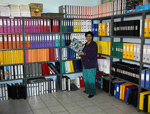 The biggest advantage in making their bulk purchases from the UAE, for African buyers, is that they can purchase just the quantities they require. While theoretically it is possible for African buyers to source their supplies directly from manufacturers in the Far East, such orders would normally be for at least one container load, if not more. Most African buyers, on the other hand, do not require the merchandise in such large quantities and are more comfortable with sourcing smaller quantities of different commodities from Dubai, stuffing them into one or two containers and then shipping the goods to their African destinations. The fact that Dubai has excellent shipping connections means that African buyers can ship their purchases to literally any destination on the continent. Thus, not only do African stationery dealers have in Dubai the ideal location where they can find all their requirements in one city but also have the means of transporting it back home very conveniently and cheaply.
The biggest advantage in making their bulk purchases from the UAE, for African buyers, is that they can purchase just the quantities they require. While theoretically it is possible for African buyers to source their supplies directly from manufacturers in the Far East, such orders would normally be for at least one container load, if not more. Most African buyers, on the other hand, do not require the merchandise in such large quantities and are more comfortable with sourcing smaller quantities of different commodities from Dubai, stuffing them into one or two containers and then shipping the goods to their African destinations. The fact that Dubai has excellent shipping connections means that African buyers can ship their purchases to literally any destination on the continent. Thus, not only do African stationery dealers have in Dubai the ideal location where they can find all their requirements in one city but also have the means of transporting it back home very conveniently and cheaply.
With the emergence of Africa as one of the major re-export markets for the United Arab Emirates, many Dubai-based exporters have begun concentrating their marketing efforts towards the ‘dark continent’. In the recent past, UAE companies have begun developing direct contacts in the African market to further boost their market share in this booming continent and the indication is that Africa will become an increasingly important destination for UAE re-exports in the months and years to come.
Exhibitions and trade fairs have played an important role in promoting Dubai’s status as a trading centre for Africa. “A large number of African visitors are now visting Paperworld Middle East in search of new sources of supply,” says Alexandria Robinson, Senior Show Manager of Paperworld Middle East. “By visiting the exhibition, African buyers are able to meet suppliers from all across the world under one roof. The ease of doing business with Dubai, its geographical proximity to Africa, convenient and efficient air and sea connectivity to Africa – have all attracted a growing number of Africans to Paperworld Middle East,” she opined.
The forthcoming Paperworld Middle East, being held in Dubai 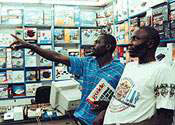
Referring to the measures being taken by the stationery trade in the UAE to make even further inroads into African market, Mohammed A. Basith of Al Hathboor Stationery said that a number of Dubai traders have appointed distributors in many African countries, especially in Kenya which has emerged as one of the leading distribution centres for the whole of Sub-Saharan Africa, he said. Other countries that are significant importers of stationery from Dubai include wholesalers, retailers, traders in Uganda, Tanzania, Congo, Eritrea, Sudan, Nigeria and South Africa.
Industry experts believe that African markets are extremely price sensitive and most of the requirements originating from Africa are for low priced goods – quality being a secondary consideration. It is for this reason that goods from China, Korea, Hong Kong and other Far Eastern countries have been more successful in African markets as compared to those from Europe.
Stationery dealers in Dubai, renowned for their business acumen and foresight, have identified Africa as one of the fastest growing markets for re-exports and are actively engaged in promoting their products in African countries like Nigeria, Kenya, Uganda, Eritrea, South Africa, Tanzania and Senegal. Traders and businessmen from these countries have been purchasing bulk quantities of stationery items from Dubai not only to meet the increasing demand for these products in their own countries, but also to meet the requirements of neighbouring countries as well.
Traders from Uganda, for instance, have been buying from Dubai bulk quantities of low-priced exercise books for schools and distributing the same to nearby countries of Rwanda, Congo and Tanzania.
The tremendous growth of UAE’s stationery trade has resulted in the development of a small but significant manufacturing sector. A number of stationery items like fax, rolls, exercise books, notepads, box files, computer paper, photocopy paper, laser printing paper, diaries etc. are now being manufactured in the UAE itself to meet the increasing demands for these products.
The 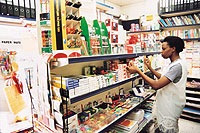 Jebel Ali Free Zone has become a major centre for the manufacturing and export of stationery products from the United Arab Emirates. Several companies based in the Jebel Ali Free Zone have been actively feeding the African markets. Most of these companies have been vigorously promoting their brand names in the African markets through their exclusive dealers and distributors. Speaking about his experience in the stationery trade with Africa, Ramakant Sherke, General Manager of Majlan Stationery, said that it is very profitable to do business with African buyers because they are generally ‘cash’ customers and regularly come up with repeat orders. « The market for stationery products in Africa is growing at a fast pace and the prospects for the short-term future remain very bright, » he said.
Jebel Ali Free Zone has become a major centre for the manufacturing and export of stationery products from the United Arab Emirates. Several companies based in the Jebel Ali Free Zone have been actively feeding the African markets. Most of these companies have been vigorously promoting their brand names in the African markets through their exclusive dealers and distributors. Speaking about his experience in the stationery trade with Africa, Ramakant Sherke, General Manager of Majlan Stationery, said that it is very profitable to do business with African buyers because they are generally ‘cash’ customers and regularly come up with repeat orders. « The market for stationery products in Africa is growing at a fast pace and the prospects for the short-term future remain very bright, » he said.
Among the major destinations for stationery products from the the UAE to Africa is Kenya which has indeed become a very important trading partner. The liberalisation of the Kenyan economy has resulted in a marked increase in products such as stationery and office supplies. This demand was earlier being serviced by certain European countries, especially the United Kingdom, which had enjoyed the status of being the larger supplier of goods to Kenya for many years.
The UAE entered the Kenyan market in a big way by supplying quality goods at extremely competitive prices to importers in Kenya. Trade ties between the two countries are specially significant in light of the fact that both countries enjoy the status of being the distribution hubs of their respective regions. Dubai is now the undisputed trade and distribution hub of the Middle East, whereas Kenya, through its port in Mombasa, has been servicing trade traffic not only for many countries on the East coast of Africa but also for many landlocked countries in the Sub-Saharan African region. Mushtaq Imran Ali, Director of Al Uloom Stationery LLC, said that the UAE’s trade with Africa has more than doubled in the past two years. Stationery being a sizeable component of this trade, has shown very healthy growth trends and traders see continued profitability in these operations.
Another major destination for stationery products is South Africa, which has emerged as one of the UAE’s leading trading partners in the region. Though South Africa’s links with the Gulf are not very old, they have gained in prominence, especially among the business community. After sanctions were lifted in the early 1990s, South Africa emerged as one of the most active trading partners of the UAE. Rather than depend on local sources of supply, African tradersare now turning more and more to the international market to meet the increasingly sophisticated demands of their customers. People are no longer satisfied with poor quality products and are willing to pay good prices for quality products.
Sourcing these materials from suppliers in Dubai, makes eminent sense as the emirate is the trading hub of the entire region. « Transportation links to all parts of the globe, low freight rates, wide variety, high quality goods and very remunerative prices make this the ideal location for African buyers to procure all their stationery requirements, » says Dawood, Director of Noor Al Ilm Stationery. Not only are traders in Dubai able to source quality products at most competitive prices from virtually all the reputed international manufacturers, they also have long experience in the re-export business that make them the ideal partners for stationery traders from Africa.


